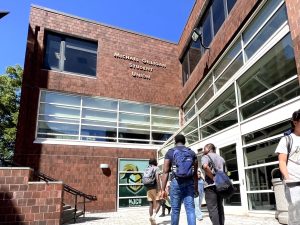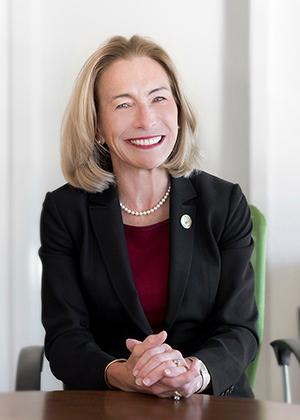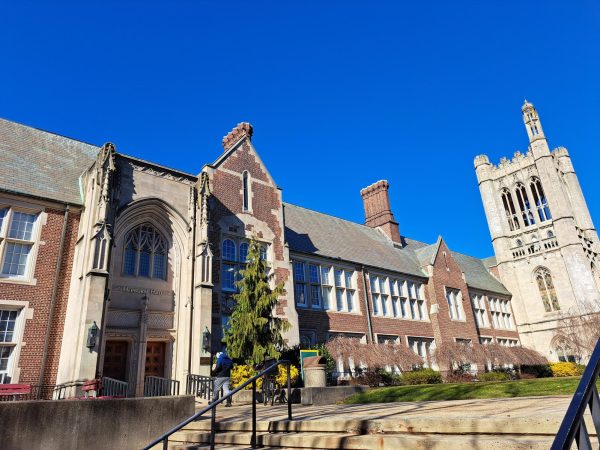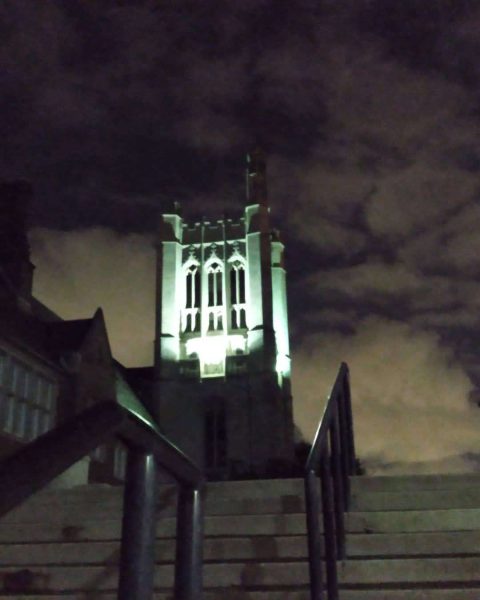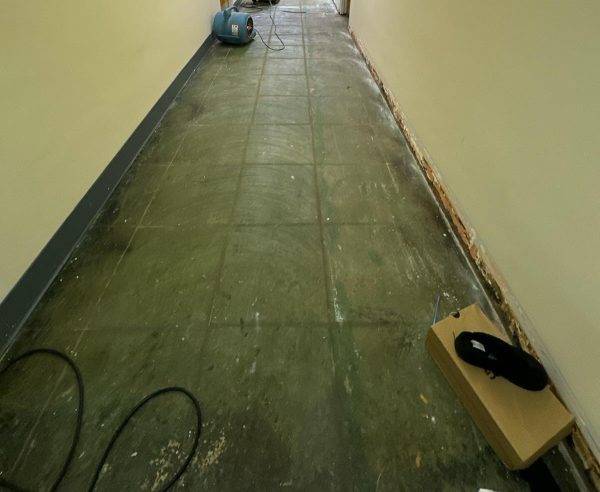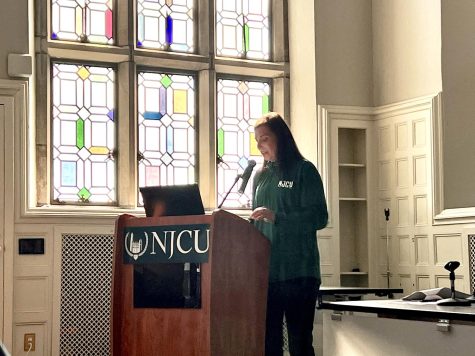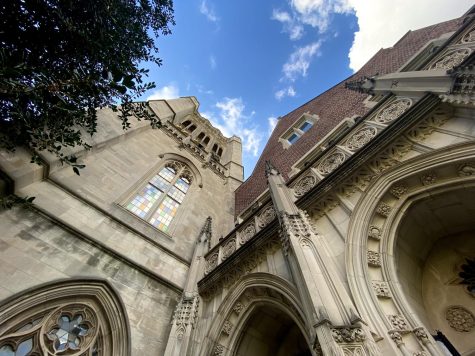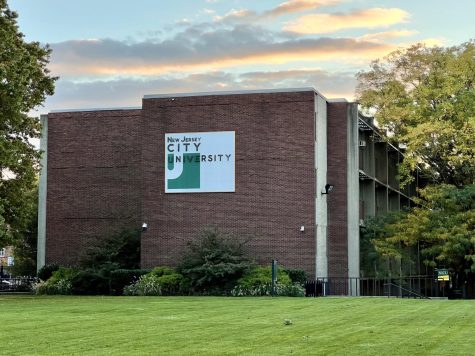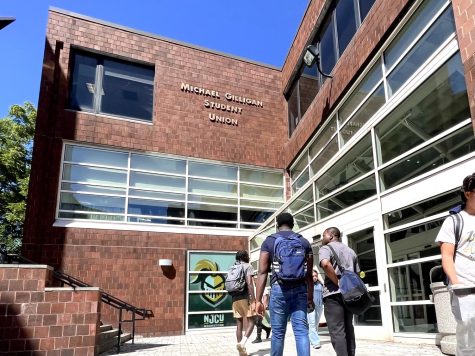Students Claim ‘More Questions Than Answers’ At Recent University Meetings
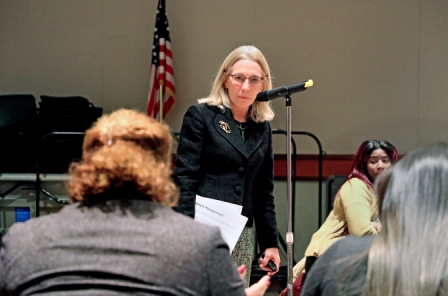
Photo Credit: Dakota Santiago.
“President Sue Henderson speaks at SGO council meeting to answer sought after questions.
March 28, 2015
Students have sounded the alarm on a number of issues at three recent university
meetings.
Among the issues raised are the administration’s transparency, the evaluation of
professors, the availability of space at the Gilligan Student Union building for campus events,
and overall class availability.
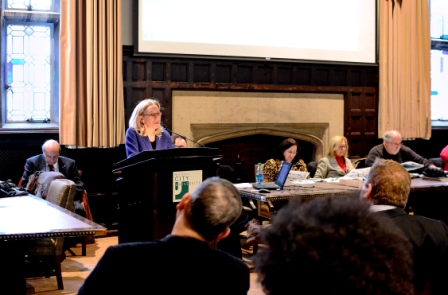 Photo Credit: Dakota Santiago.
Photo Credit: Dakota Santiago.
“Students, but mainly seniors, have a hard time filling up their final major classes.
Often times, classes don’t reach the 12-student minimum to continue and are dropped so
students end up staying an extra semester or two until the class they need is offered,” said SGO
President Alvert Hernandez at the university senate meeting in early February.
“We have a growing number of seniors who end up staying five…six…seven…eight
years. If you want to increase the graduation rate you have to offer classes.”
During his speech, Hernandez referred to NJCU’s undergraduate enrollment report
for the semester of spring 2015, which shows that the number of seniors at NJCU is 2,267 – a
figure that is nearly triple of the number of freshmen.
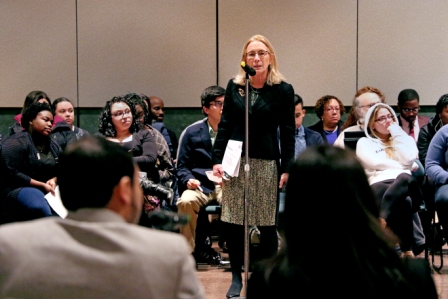 Photo Credit: Dakota Santiago.
Photo Credit: Dakota Santiago.
“(In terms of) class scheduling, I agree with you completely,” said NJCU President
Henderson in response to Hernandez.
“By the way, at Georgia State University (GSU) they started looking at why students
couldn’t finish and here’s what they figured out. They now have a four-year map for all their
students,” she added. “So a student knows when they come in, what the classes are and then
advisors work really hard with those students. And because they’ve done that, they’ve had less
of that cancelling problem and it’s been because it’s been a group effort.”
SGO Executive Vice President Liz Jimenez said she’s bothered by Henderson’s
comparison between NJCU and GSU.
“(The two schools) are very different campuses and for her to continually make
comparisons makes me doubt the realistic reach of her vision for NJCU. GSU is a southern,
division I school with a student population of 32,000 whereas NJCU is a northern, division III
school, with a current student population of 8,000,” Jimenez said.
Both Jimenez and Hernandez have also brought the issue of transparency between the
administration and students to the forefront.
Henderson has admitted the school could have done a better job communicating the
credit policy change — which went into effect last semester — and will continue to work on
ways to communicate information to students effectively.
“My suggestion would be to have open forums, send out an official email stating
changes and what they mean for students, and informing SGO at council meetings,” said
Hernandez.
President Henderson noted she hopes to meet with SGO staff to further discuss student
concerns and how the university is taking student feedback from recent surveys into account.
“We compiled all the comments that the students made. There were great things they
said about concerns that they had, but there were also fabulous things they said about why they
came here and why they value it,” said Henderson.
Students and faculty also met during a recent town hall meeting on Feb. 18 – where
attendees nearly spilled out the door.
There, Henderson discussed enrollment management, student retention, graduation, the
new west campus, science building renovations and the relocation of the business school.
At the conclusion of Henderson’s presentation, the floor was open to questions and
students were eager to address a number of topics: What academic strategies do we have
in place for NJCU to keep students interested? When will the school update the university
website? Will more members of NJCU’s administration be attending student events? Will
NJCU consider offering fall graduation?
“I think it’s really good the president is having these meetings around campus to discuss
important topics,” said 20 year-old Corrine Reilly-Feretto who attended the town hall meeting.
“During the meeting I asked about our professors. I’ve had about 50 percent adjunct
professors and I wanted to know if they are going to get office hours since a lot don’t. I had an
adjunct professor for a psychology class recently and I’m not that good with psych. She would
come in to school early and help me with research and we met on campus since she didn’t have
an office.”
NJCU officials said they are considering using some of the space in the Professional
Studies Building (which will be vacant since the business school is moving) for adjunct
professors to use as offices.
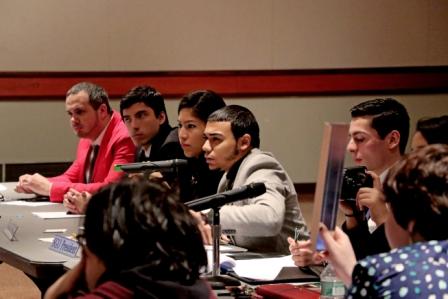 Photo Credit: Dakota Santiago.
Photo Credit: Dakota Santiago.
A university survey (handed out at the university senate meeting) highlighted how 44
percent of seniors have schedule problems due to classes not being offered, 48 percent work
part-time, 37 percent live 1 to 5 miles from campus and 71 percent do not have children or
others they care for.
However Hernandez questions the validity of the survey due to the fact the number
of students that took the survey is 906 – 15.8 percent of the school’s 6,083 undergraduate
students.
One of the newest issues conveyed by students is the fact third party organizations at
times book event-space in the Gilligan Student Union Building, in some cases leaving school
clubs to cancel or postpone events.
“Fall 2014 had probably a handful of events that were booked by outside organizations
during the week. Unfortunately, that is unfair to clubs and academic departments that want to
host events for the student population but cannot because of outside events,” said Hernandez.
“I would like to propose that exterior events happen strictly on the weekends to alleviate
the space for our students.”
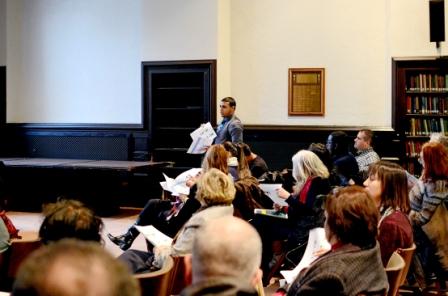 Photo Credit: Dakota Santiago.
Photo Credit: Dakota Santiago.
The most recent of meetings – held by the SGO council in late February – consisted of
President Henderson, SGO members, school club presidents and students.
In addition to a number of other topics, President Henderson discussed NJCU’s “yield
rate” (meaning the number of students that are admitted to the university versus those who
actually register), which is encouraging the school to expand marketing.
According to Henderson, Montclair University is the top school that is “stealing”
students from NJCU, with Kean University and Saint Peter’s University doing the same.
During the meeting SGO council members brought a number of other topics to the
president’s attention as well: How will NJCU plan to market some of its less-advertised
departments? Will the school consider supplementing fees for students who live in the 2040
dormitories considering their living conditions? How will Public Safety expand its services to
help protect students going to the West Side campus as well as the new business school? Does
the school have a plan in place to communicate information to students?
President Henderson ultimately met the majority of questions by asking students to
email her in order to partner with administration and address concerns thoroughly.
When asked what one of her goals is for the university she said, “What I’d like to see
in 5 years is an increase in graduation rates…the workforce needs you and I just need to make
sure you’re prepared.”
Hernandez expects some of the issues brought up during the meetings will have answers
in the near future. SGO plans to hold meetings (which you are invited to) on March 16, 30 and
April 6 and 20. These dates are subject to change due to weather so visit www.njcu.edu/sgo for
updates.






